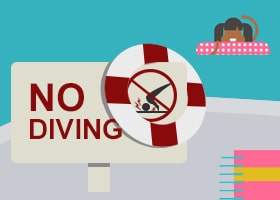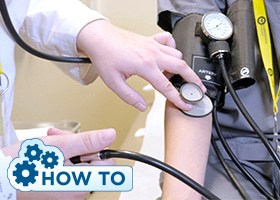Are you a Licensed Practical Nurse or Licensed Vocational Nurse (LPN/LVN) looking for your next career move? Consider becoming a Registered Nurse (RN).  Few industries are booming as fast as the healthcare industry, where registered nurses fuel the engine of patient care. The Bureau of Labor Statistics shows the field of registered nursing as expected to grow by 16% from 2014 to 2024—much faster than average.1 With such a bright outlook, let’s take a look at what makes registered nursing a great healthcare career.
Few industries are booming as fast as the healthcare industry, where registered nurses fuel the engine of patient care. The Bureau of Labor Statistics shows the field of registered nursing as expected to grow by 16% from 2014 to 2024—much faster than average.1 With such a bright outlook, let’s take a look at what makes registered nursing a great healthcare career.
LPN/LVN vs. RN
While different nursing jobs* may demand many of the same tasks, there can be a world of difference between a Licensed Practical Nurse (LPN), also called a Licensed Vocational Nurse (LVN), and a Registered Nurse (RN). That’s because RNs usually have more extensive education, including a nursing diploma, an associate degree, or a bachelor of science in nursing. An LPN/LVN may only need a post-secondary non-degree award, while every RN needs a degree and must be licensed. A registered nurse will typically work at a hospital (over 60%2 do) while an LPN/LVN typically will not (less than 20%3 do).
Key differences between LPN/LVN and RN:
- RNs have higher salaries and more responsibilities.4,5
- RNs can specialize in areas like clinical care and neonatal medicine. 6
- The career trajectory for RNs can include management and education. 7
Job Description
The difference between a licensed practical/vocational nurse and registered nurse job duties is significant. An LPN/LVN may be primarily an assistant to a nurse or physician, doing everything from making beds, delivering meals, and cleaning up after patients. By contrast, an RN takes a much more dynamic approach to patient care. Registered nurse job duties may include: consulting with patients in order to help plan out treatment, supervising other hospital or clinical workers, inserting and measuring intravenous treatments, recording patient data, and administering medicine. An LPN/LVN may draw blood or run tests, but is not allowed to assess a patient or offer any type of medical advice.
Available RN Specializations
Registered nurses may also specialize in some of the following fields with additional certifications and training8:
- Gerontology
- Pain management
- Midwifery
- Neonatal
- Clinical Care
- Medical-Surgical
- Critical care
- Emergency Care
Employment Rate
The raw numbers for nursing jobs demonstrates how valuable registered nurses are for the healthcare industry. In the United States alone, about 2.8 million9 RNs held employment in 2014, compared with only 719,900 LPN/LVNs. This disparity in nursing careers is set to increase, furthermore, as the industry will grow to demand 3.1 million RNs by 2024, but only 837,200 LPN/LVNs. The need for more and more RNs to work with hospitals, clinics, and private medical providers has been called one of the greatest shortages in the economy today. The BLS reports that more RNs will be needed due to a number of reasons: more emphasis on preventative care, higher rates of chronic medical conditions, and an aging population.10
How to Become a Registered Nurse
Graduating from an approved nursing program is the minimum education threshold for an RN. Then, every state requires RNs to pass the National Council Licensure Examination for Registered Nurses (NCLEX-RN). Many nurses begin their careers as LPN/LVNs, achieving that first step and then either proceeding to complete a degree or entering into the workforce to start earning a paycheck immediately. A Nursing Bridge program can be a great way for an LPN/LVN to transition their skills into the fast-growing, rewarding career of a registered nurse.
Nursing Bridge Program
An LPN/LVN to RN bridge program provides the necessary vocational skills for a practical or vocational nurse to registered nurse career transition, sometimes transferring over credits from previously completed classes. Students who have already completed LPN/LVN programs will be able to use their experiences to help them through an RN program. At the end of the day, working as a registered nurse will demand a higher salary and include more responsibilities. With ample opportunities, registered nursing is the cornerstone of healthcare, offering good compensation and growth for the duration of a nurse’s career.
*Individuals seeking to enter this career field may be subject to screenings such as, but not limited to, criminal background checks and drug/alcohol testing prior to externship, to attain occupational licensure/certification or employment, and throughout their careers.
Additional Sources: [1] – Bureau of Labor Statistics, U.S. Department of Labor, Occupational Outlook Handbook, 2016-17 Edition, Registered Nurses, on the Internet at http://www.bls.gov/ooh/healthcare/registered-nurses.htm [2] – http://www.bls.gov/ooh/healthcare/registered-nurses.htm#tab-3 [3] – http://www.bls.gov/ooh/healthcare/licensed-practical-and-licensed-vocational-nurses.htm#tab-3 [4] – http://www.bls.gov/ooh/healthcare/licensed-practical-and-licensed-vocational-nurses.htm [5] – http://www.bls.gov/ooh/healthcare/registered-nurses.htm#tab-1 [6] – http://www.bls.gov/ooh/healthcare/registered-nurses.htm#tab-2 [7] – http://www.bls.gov/ooh/healthcare/registered-nurses.htm#tab-2 [8] – http://www.bls.gov/ooh/healthcare/registered-nurses.htm#tab-2 [9] – http://www.bls.gov/ooh/healthcare/registered-nurses.htm#tab-1 [10] – http://www.bls.gov/ooh/healthcare/registered-nurses.htm#tab-3



